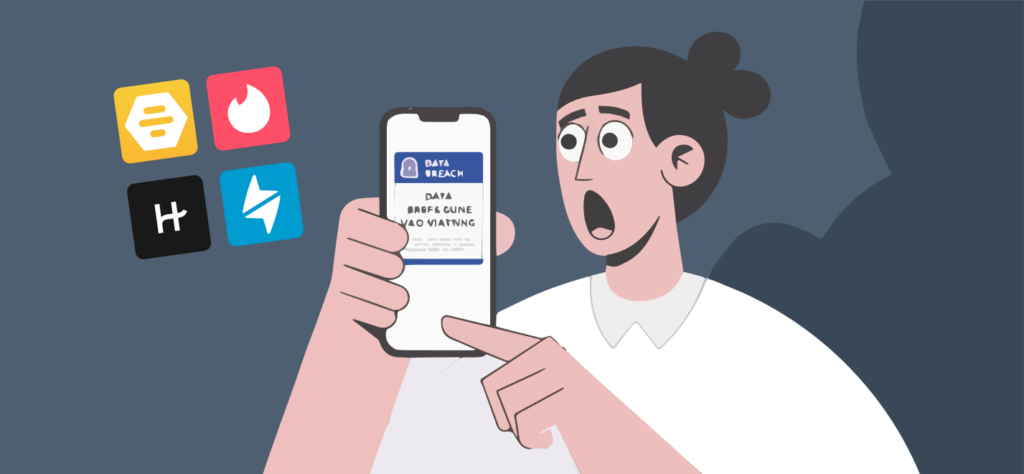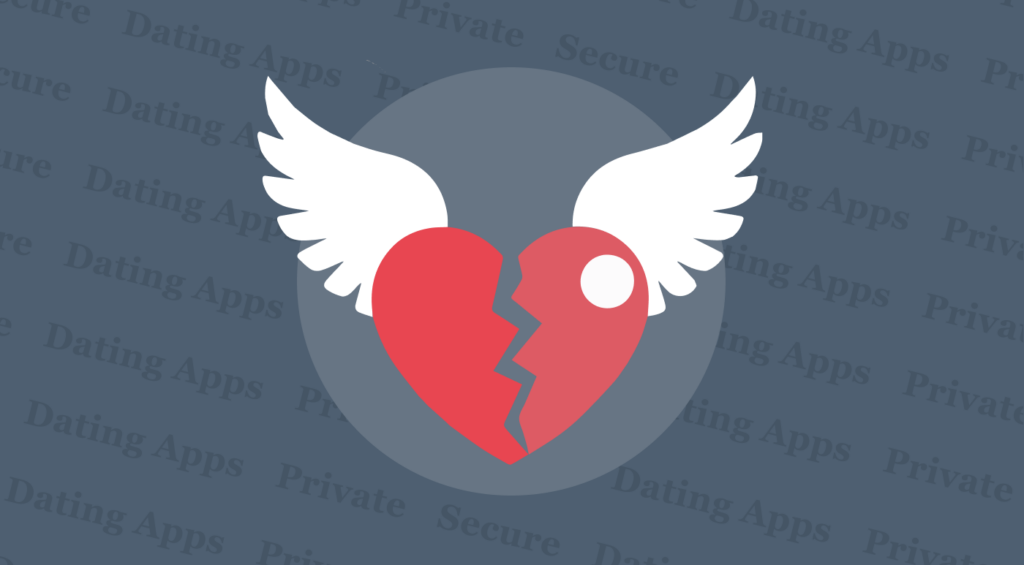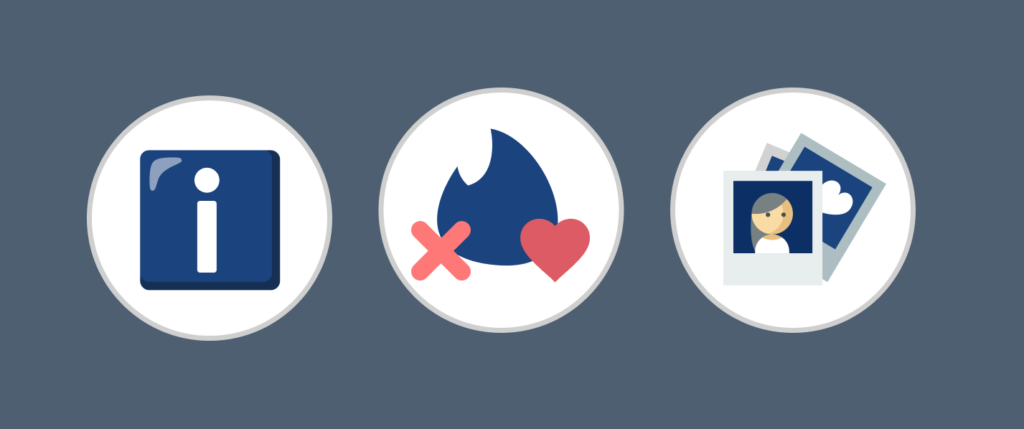
Online dating apps like Tinder and Bumble have brought hundreds of people together, which has led to serious relationships, marriages, and close friendships. However, there are certain safety precautions you must take if you use these apps.
This article will discuss the dangers of online dating and how to be private and secure on dating sites.
What is Private Dating?
Private dating is the use of dating sites and apps with increased security features to ensure your safety and protect your personal information. They ensure a safe environment for interacting and meeting new people on such platforms.
What Data Do Dating Apps Collect?

Dating apps collect a lot of vital data without you realizing it. Tinder, for example, collects the following data:
- Your approximate location
- Your email address
- Your date of birth
- Your political beliefs
- Your interests and preferences
- Your sexual orientation
- Two pictures of you
Aside from collecting your information, some dating apps share it with third parties to make personalized ads, and this is how they can continue operating while providing free service. You should also notice that there are better privacy controls for dating apps when you subscribe to them instead of using their free services.
Data Breaches of Dating Apps

The security of people’s personal data on dating apps is questionable due to the vulnerabilities that most have been subjected to over the years. Dating apps have suffered several data breaches in the past, and some have been found guilty of improperly sharing their users’ data with third parties.
This implies that you should be careful when providing your personal data to these apps. Here are some examples of the data breaches of these dating apps:
Grindr
In 2014, some experts determined that Grindr allowed a trilateration attack (which allowed third parties to ascertain the location of users) to an accuracy of up to a few hundred feet. In 2016, some researchers in Japan could still determine Grindr users’ location even after Grindr claimed to have resolved the issue.
It was later discovered that the dating platform was sharing the health information of its users with third parties without the users’ consent. This health information included the HIV status of the users. Afterward, they announced they would stop sharing health information with third parties.
Tinder
In 2013, some users noticed the same security concern with Tinder: the app allowed third parties to determine users’ locations from a few hundred feet. They resolved the issue by making location data less precise.
In 2018, Checkmarx, a cybersecurity firm, found out that Tinder was lacking an HTTPS encryption feature on its Android and iOS apps. This encryption basically secures photos of users using the platform. This meant that malicious persons could view the same pictures a Tinder user was viewing while connected to the same WiFi network.
This raised many safety concerns about the dating app. However, Tinder incorporated HTTPS encryption into all its services after some time.
MeetMindful.com
MeetMindful.com suffered a massive data breach in 2021, which exposed the data of all its about 2.3 million users. The exposed data included users’ full names, location, Facebook IDs, email addresses, and many others.
Bumble
In 2022, experts found out that Bumble was harvesting sensitive data from its users without their consent and knowledge and shared this data with Facebook, Instagram, and other third parties. In 2023, it was discovered that Bumble also allowed a trilateration attack which could expose the exact location of its users to hackers and third parties.
Dangers of Online Dating

Online dating might be very fun and interesting, but it also comes with its own dangers and risks, which are not limited to getting heartbroken. These include:
Catfishing
Catfishing describes a misleading online dating profile in which a user creates a fake profile or uploads attractive pictures of other persons. This could be done to lure unsuspecting victims into a relationship, to start a relationship with a person using a fake persona, or to scam them of their money.
Catfishing could lead to emotional harm and wasted time, and it poses a safety risk if you decide to meet in person.
Harassment and Unwanted Messages
Sexual predators can use online dating platforms to find and harass victims, especially minors. Furthermore, research by the Pew Center showed that women experience harassment and are sent sexually explicit images and messages that they never asked for.
The study also showed that women between the ages of 18 and 34 gave reports of physical harm threats, which begs the question, “Is online dating safe for women?”
Online Dating Scams
Scammers can use online dating apps and sites to exploit people who are genuinely searching for romantic partners.
They join the online dating platform, posing as potential partners for unsuspecting individuals, usually in the form of catfishing. Their main aim is to collect personal details, gifts, or money from victims using emotional triggers.
Stalking
Stalking involves unwanted behaviors and actions committed by obsessive individuals. These actions usually inhibit the victim’s freedom and disrupt their daily lives, leading to distress, fear, and alarm, compromising their online dating safety.
The same research by the Pew Center gives another shocking realization. About 37% of people using online dating apps indicated that users were still sending them messages even after they had expressed their lack of interest.
A greater danger to this is that the stalker can even switch to real-life stalking if they know your location, posing a greater safety risk.
Online Dating Addiction
Some users of online dating apps and sites may become addicted to these platforms. This addiction may cause individuals to spend excessive time on the platforms, which could affect their real-life relationships, self-esteem, and mental health.
Tips to Do Online Dating Safely

Now that you know the dangers of dating apps and sites, you should prioritize your safety while using these platforms. Follow these tips to know how to be private and secure on dating apps free of charge:
Guard Your Personal Information
When you are just meeting a person online, do not share personal information like email address, phone number, workplace, date of birth, and full name with them. Limit the information you give to them, as you don’t know what kind of person they are. Hackers can use this information to guess your passwords. You should use your first name or a nickname instead.
Stay within the Dating App or Site
Do not take conversations out of the dating app or site to phone numbers or emails until when trust has been established. Malicious persons might suggest using messaging platforms like WhatsApp and other encrypted messaging platforms since their actions will be less monitored on them.
Staying within the dating platform gives an additional layer of protection, and you won’t worry about the other party having your phone number, even if things don’t work out eventually.
Use a Unique Photo
Avoid using the same photo on your social media accounts and your online dating profile. Scammers and stalkers can easily trace and find you on social media. You should also not use pictures through which your place of living and work can be easily determined, as it predisposes you to risks.
Use a Trustworthy Online Dating Platform
There are countless online dating platforms, and selecting one can be troublesome. It is best to do personal research and filter out the most dangerous dating apps. The more popular ones with a higher number of users are more advisable, as they will be better at securing your private information.
Report Malicious Persons
Dating apps and sites have the option to report or block malicious persons. If a person makes you feel uncomfortable or violates the platform’s terms of service, reporting them is the right thing, as it helps make the platform safe by removing all illegal and malicious behaviors. You can also block such people for your own good.
Do Not Interact with Suspicious Profiles
Avoid interacting with people who have very little information about them or only one picture on their profile, as they are most likely scammers using fake accounts.
Avoid Sharing Financial Information or Sending Money
Do not send money to someone you met on an online dating site, even when they bring up a very touching story or describe it as an emergency, as that is most likely a scam.
Wired money is impossible to reverse, so you should report or block anyone who makes such demands. Financial information is also very important and should be kept private so that scammers will not access your financial accounts.
Avoid Long-distance Relationships
Avoid individuals who claim they are from your country but are stuck somewhere else, especially those who demand money so they can return home. Also, you must avoid or block people who refuse to meet in person and refuse a voice or video call, as they are most likely scammers.
Meet in a Public Place
Your first few meetings with a date from an online dating platform should be in populated, public places. Do not agree to meet in private locations like your home or your date’s home. End the date if your date is adamant about meeting in a private location.
Be in Control of Your Transportation
Take charge of your rides for your first few meetings. This makes it easy for you to arrive and leave whenever you want, especially if you are becoming uncomfortable. This involves taking a cab or using the subway. Relying on your date to take you to the location and back home is romantic but risky. Save it for when trust has been fully established.
Inform Someone About Your Plans
Tell your family or friends about your plans when you are meeting someone in real life for the first time. Tell them where and when you are to meet and what time you should be back home. Keep your phone charged and with you at all times. You can also plan a ‘safe call,’ where your friend calls you during the date to confirm that you are safe.
Don’t Leave Your Personal Items and Drinks Unattended
For security purposes, you should only accept drinks poured and served by the server or bartender. If you don’t pay attention, malicious persons can slip tasteless, odorless, and colorless substances into your drink. You should also keep your wallet, phone, and purse with you at all times, especially if they contain personal information.
Trust Your Instincts
If you feel someone is not truthfully representing themself, trust your instinct and cut off the communication. If you are uncomfortable or feel unsafe on the date, you should leave immediately.
This may not be the ideal time to bother about acting rude, as your safety is more important. Report and block such individuals so that they won’t interact with your profile again.
Delete Your Profile if You Don’t Use the Platform Anymore

After finding a suitable partner and getting into a serious relationship, you might want to uninstall the app or stop visiting the online dating site. Before uninstalling the app or ghosting the site, you should delete your profile for maximum security.
If the platform doesn’t have an option to delete your profile, insert fake details into your profile, so it won’t give away real information about you.
Conclusion
Online dating apps are resourceful, and when used properly, they aid people in finding true love. However, there are also risks and dangers in using these platoforms.
By staying active and following the tips shared in this article, you can easily avoid the risks and threats associated with online dating sites.
